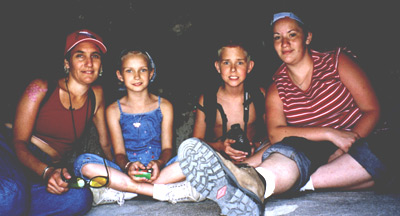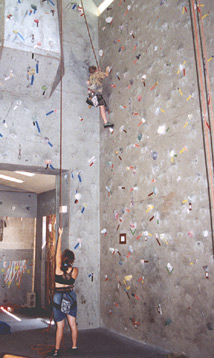
Alongside my individual and group sessions, I use intensive learning sessions to gain a better idea of children's learning styles and skills, and to strengthen relationships both on a one-to-one basis, and as part of a group. These sessions, known informally as 'Camp Sydney', vary in their format, based on the particular needs of those children who participate, but normally combine activities such as rock climbing with a wide range of project-based learning experiences, designed to use childrens' strengths to work on their weaknesses, and to redirect frustrations towards the rewarding completion of tasks.

At the heart of each camp is some kind of physical activity, conducted in a supervised environment with all necessary safety equipment. Rock-climbing is a perennial favorite, but other camps have included ice-skating, hiking, or scavenger hunts in the woods or on the beach. The advantage of this format is that it introduces the children participating to goal-based exercises in an informal, non-judgemental environment, well away from settings that might be associated with any previous learning difficulties: that is, somewhere that won't remind them of the classroom or a therapist's office.
Participants are asked to pack clothes, healthy snacks, and learning materials such as pens, paper and rulers. The aim of this is to emphasize organisational skills and personal responsibility which will continue into the day's activities. Being able to organize your backpack provides an important first step when it comes to the team-based organization that's required during the camp's physical activities and the learning exercises that follow.
The children are also asked to bring examples of their school-work, showing their best and worst work in subjects such as writing, math, science and social studies, as well as any other projects they wish to show to me. This provides me with a basis for assessing their strengths and weaknesses, in order to fine-tune the exercises which take place during the camp.

After the 'activity', whether outdoor or indoor, we work together to produce a record of our experience, either as a written journal, or in visual form as a mural or poster. The aim of this exercise is to build up interpersonal skills among the group, by emphasising the role of teamwork in completing the project. The participants are encouraged to share their strengths with each other, not simply in the assignment of roles, but though peer-coaching, where children teach their peers some of the skills that they possess, but which others may have difficulties with. This project is also geared towards teaching the participants to make compromises towards reaching their goal, and towards encouraging them to offer and accept both feedback and constructive criticism.
These exercises teach general academic skills in a non-academic environment, such as the organisation of material towards a specific goal, the assessment of details, self-evaluation of written materials, and the editing of material to suit that goal, as well as for syntax and clarity. We use graphic organisers for brainstorming, and encourage the production of visual accompaniments for written material. Participants will be asked to document the day's activities with video footage, photographs and pictures.
The aim of these camps is straightforward: 'lots of experiences and application of experiences'. By introducing goal-based activities outside of the classroom, and emphasizing personal responsibility and co-operation, it helps challenge issues of 'learned helplessness' and builds trust relationships between children and their peers, as well as with myself, providing a valuable foundation for future work.
Previous story:
Assessment techniques - refining, not reinventing the wheel
Next story:
Professional Development - sessions and seminars for educators
Back to 'For Professionals' index
